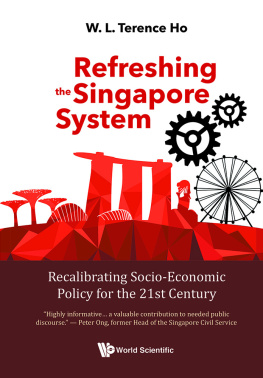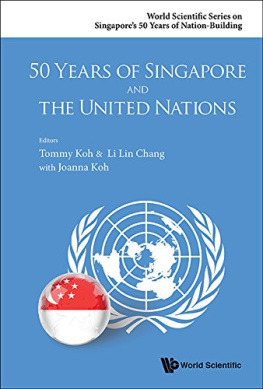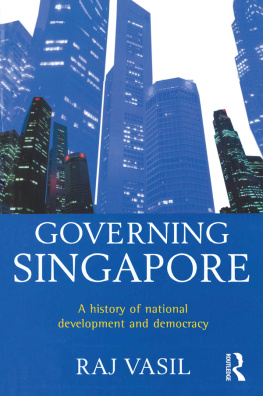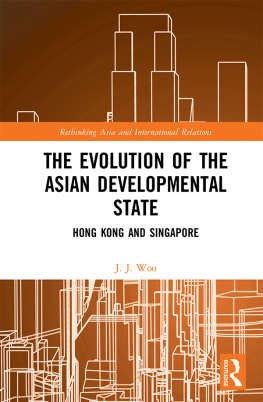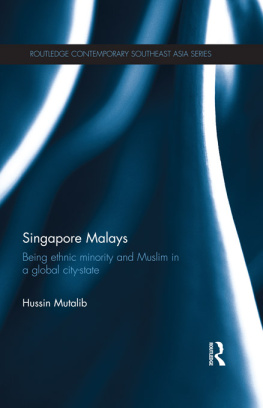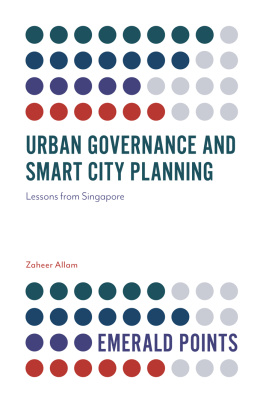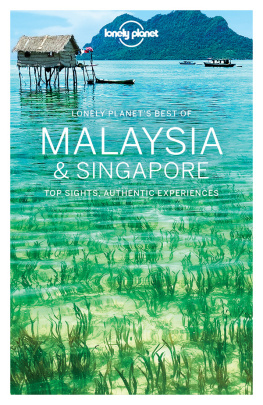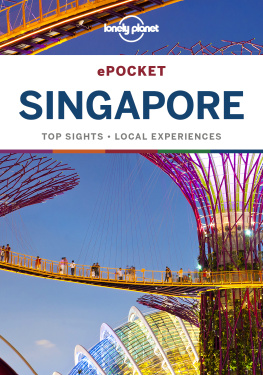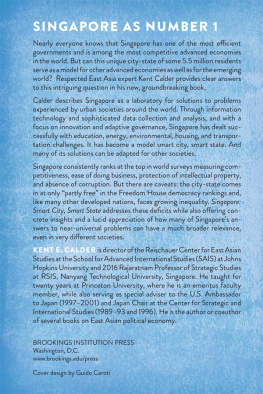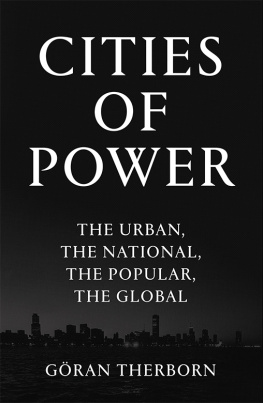Global City Futures
GEOGRAPHIES OF JUSTICE AND SOCIAL TRANSFORMATION
SERIES EDITORS
Mathew Coleman, Ohio State University
Sapana Doshi, University of Arizona
FOUNDING EDITOR
Nik Heynen, University of Georgia
ADVISORY BOARD
Deborah Cowen, University of Toronto
Zeynep Gambetti, Boazii University
Geoff Mann, Simon Fraser University
James McCarthy, Clark University
Beverley Mullings, Queens University
Harvey Neo, National University of Singapore
Geraldine Pratt, University of British Columbia
Ananya Roy, University of California, Los Angeles
Michael Watts, University of California, Berkeley
Ruth Wilson Gilmore, CUNY Graduate Center
Jamie Winders, Syracuse University
Melissa W. Wright, Pennsylvania State University
Brenda S. A. Yeoh, National University of Singapore
Global City Futures
DESIRE AND DEVELOPMENT IN SINGAPORE
NATALIE OSWIN
THE UNIVERSITY OF GEORGIA PRESS
Athens
Portions of this work appeared previously in the following publications: Chapter
2 appeared in an abbreviated form in 2010 as Sexual Tensions in Modernizing
Singapore: The Postcolonial and the Intimate, Environment and Planning D:
Society and Space 28(1): 128141. Portions of appeared in 2012
as The Queer Time of Creative Urbanism: Family, Futurity and Global City
Singapore, Environment and Planning A 44(7): 16241640. Portions of chapters
2 and appeared in 2010 as The Modern Model Family at Home in Singapore:
A Queer Geography, Transactions of the Institute of British Geographers 35(2):
256268. Parts of the introduction appeared in 2015 as World, City, Queer: The
Sexual Politics of Global Urbanism, Antipode: A Radical Journal of Geography
47(3): 557565.
2019 by the University of Georgia Press
Athens, Georgia 30602
www.ugapress.org
All rights reserved
Set in Minion Pro by Graphic Composition, Inc. Bogart, GA.
Most University of Georgia Press titles are
available from popular e-book vendors.
Printed digitally
Library of Congress Cataloging-in-Publication Data
Names: Oswin, Natalie, 1971 author.
Title: Global city futures : desire and development in Singapore / Natalie Oswin.
Description: Athens [Georgia] : The University of Georgia Press, 2019. | Series:
Geographies of justice and social transformation ; 44 | Includes bibliographical
references and index.
Identifiers: LCCN 2018042682| ISBN 9780820355016 (hard cover ; alk. paper) |
ISBN 9780820355023 (pbk. ; alk. paper) | ISBN 9780820355009 (ebook)
Subjects: LCSH: GaysSingaporeSocial conditions20th century. | Gays
SingaporeSocial conditions21st century. | HomosexualityPolitical
aspectsSingapore. | Gay rightsSingapore. | SingaporePolitics and
government19651990. | SingaporePolitics and government1990 |
Economic developmentPolitical aspectsSingapore.
Classification: LCC HQ76.3.S55 O89 2019 | DDC 338.95957dc23
LC record available at https://lccn.loc.gov/2018042682
CONTENTS
FIGURES
ACKNOWLEDGMENTS
This book about the politics of heteronormativity in Singapore has taken much longer to write than I initially anticipated it would, in part because finding a balance between the productive and socially reproductive sides of my life has been difficult over the last several years. I know I am far from alone here, among people like myself whose reproductive desires are sanctioned by the state in which they reside and especially among those who due to homophobia, transphobia, racism, sexism, national bias, and more are not in such a position of privilege. Creating familial lifeworlds can be a joyous and rewarding process. But it can also be difficult and consuming, especially when state and society put up barriers for those cast as less than desirable as primary caregivers for future generations. I raise this point because it resonates so strongly with the books concerns, and because it is one that is too often unacknowledged in the field of academic knowledge production. Whats more, it is unacknowledged by design. The divisions between public/private, productive/reproductive, male/female, straight/queer, cisgender/trans, savage/civilized, traditional/modern have been well deconstructed through decades of postcolonial, critical race, feminist, trans, and queer scholarship. But these binaries persist in all kinds of ways in all kinds of contexts, with profound material effects.
While this projects completion was delayed as I embraced caregiving responsibilities, it was also delayed as I grappled with how to convey my argument. I have been terribly conscious that the kind of expansive queer critique I advocate for in this books pages is largely absent within urban studies and Singapore studies (and many other fields of enquiry), not because many brilliant scholars somehow happen to have a collective blind spot, but because systems of production everywhere, including systems of knowledge production everywhere, have long been buoyed by inequities and injustices tied to the sort of majoritarian heterosexual reproductive futurisms I critique in this book. Along the way, I wrote drafts upon drafts of all its chapters, trying to find ways to interest a broad audience in thinking about urban and national development through the lens of LGBT issues, and trying to find a voice and a tone that would be heard. In the end, it may be that my aim to find a wide audience, even among critical scholars, is no more than a pipe dream. Though I purposefully did not put the word queer in this books title, it is in the books description. And even if it were not there, the books main emphasis on the politics of majoritarian heterosexual reproductive futurism may keep many of the readers I want to speak to away from it. For, despite my assertions to the contrary in the books description and throughout its pages, many not-so-critical and even critical scholars will see it as a book about minority issues rather than a book about socioeconomic development and urban futures, and they simply will not see the former as central to the latter. So, I first thank the readers of this book. I hope it in some small way contributes to thinking about how we can critically approach the task of building just urban futures.
More broadly, colleagues and friends at several institutions have provided encouragement and collegiality over many years. As a doctoral student at the University of British Columbia in the early 2000s, when the field of queer geographies was not nearly as established as it is today, I found mentors in Nick Blomley, Derek Gregory, Jennifer Hyndman, Geraldine Pratt, and Juanita Sundberg, and a fellow traveler in my then grad student colleague Eric Olund. I still greatly value their early support. At the National University of Singapore, where I was first an overseas student interloper, and then a postdoctoral fellow and assistant professor, I thank a wonderful community of scholars, students, and friends, including Noor Abdul Rahman, Tim Bunnell, TC Chang, Arianne Gaetano, Daniel Goh, Elaine Ho, Philip Holden, Shirlena Huang, Lily Kong, Lisa Law, Lin Weiqiang, Loh Kah Seng, Anant Maringanti, Pow Choon-Piew, Kamalini Ramdas, Shen Hsui Hua, James Sidaway, Tracey Skelton, Monica Smith, Teo You Yenn, Woon Chih Yuan, Brenda Yeoh, and Henry Yeung.
At McGill University, my academic home since 2008, Sebastien Breau, Ben Forest, Kevin Manaugh, Sarah Moser, Raja Sengupta, Renee Sieber, and Sarah Turner make the Department of Geography a collegial and rewarding place to work. Sarah Turner also deserves special thanks for doing close readings of many drafts of chapters in this book, and for always pushing me to write clearly. The McGill Institute for Gender, Sexuality and Feminist Studies does extraordinary work with far too few resources and recognition, and I am profoundly grateful for the work that director Alanna Thain, past director Carrie Rentschler, and faculty and faculty affiliates Bobby Benedicto, Mary Bunch, Jenny Burman, Michelle Cho, Gabriella Coleman, Jonathan Sterne, Jeremy Tai, Ipek Tureli, and many more do to foster queer, trans, feminist, critical race, and postcolonial scholarship and activism on our campus. At McGill, I have also been fortunate to learn from and with junior scholars including Ali Bhagat, Noelani Eidse, Gilly Hartal, Tai Jacob, Spencer Nelson, Rae Rosenberg, Kai Kenttamaa Squires, and the students who have enrolled in my Sex, Race, and Space and Queer Geographies courses over the years.
Next page


